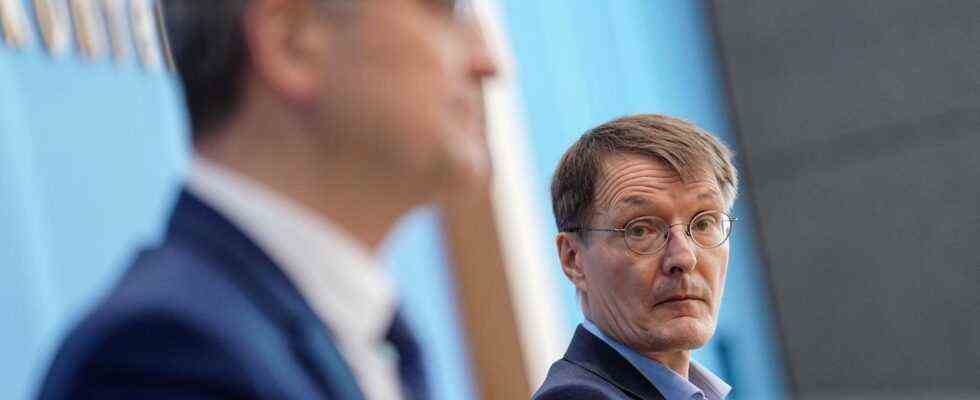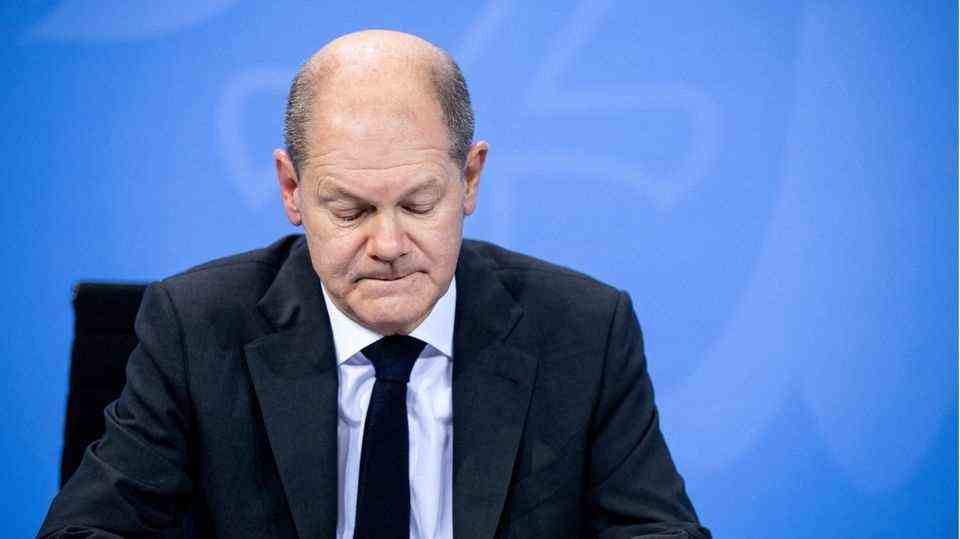analysis
Lauterbach and Wieler
Mild admonishers vs. restless warner: About a dissent that shouldn’t be
Karl Lauterbach (r., SPD), Federal Minister of Health, next to Lothar Wieler, President of the Robert Koch Institute (RKI), at a press conference on the current Corona situation
© Kay Nietfeld / DPA
No dissent, just a common goal: Health Minister Lauterbach and RKI President Wieler do not want to know anything about a rift in the fight against the corona virus. Differences become clear, however.
There may be 99 worries that Germany can worry about in the face of the corona crisis – but that it could crunch between its two top disease fighters is none of them. Carefully clarified, Federal Health Minister Karl Lauterbach (SPD) and Lothar Wieler, President of the Robert Koch Institute (RKI), tried on Wednesday to dispel any interpretations of the last 24 hours: of a dissent, even a competition between politics and science, whether more or more less hardship is required in the fight against the pandemic.
“The first question that came up was whether I still stand by Mr. Wieler,” said Lauterbach. “It’s easy to answer: otherwise he wouldn’t be here.” Wieler chuckled into the microphone: “But you are also sitting at the moment.” Lauterbach chuckled back: “Exactly.” There are two people in the same boat, the message has arrived.
In fact, Wieler was sitting again in the federal press conference next to the Federal Minister of Health, who is now called Lauterbach and the day before was probably not in the mood for fooling around.
Wieler’s Institute had made several recommendations, insisted on “maximum contact restrictions” that “should start immediately”. The time of publication raised question marks and gave rise to speculation: The federal and state governments were about to take measures that would lag behind the demands of the RKI. A calculated affront? Did Wieler feel compelled to place a protest note? After all, the RKI boss did that last “Parrot” than his Spirit Animal off, its lamented Warnings would simply no longer be heard.
everything business as usualLauterbach and Wieler struggled through the questions on the matter, no quarrel, at most priced in jerks in the implementation of the common goal of fighting the virus. Differences became clear, however.
From the perpetually alarmed warner to the mild admonisher
Right at the beginning of the joint appearance, Lauterbach described how the pandemic fight “from the point of view of the federal government” is: actually quite good.
It was possible to get the fourth wave under control. The number of cases would decrease and the measures would have a lasting effect. Even if a fifth wave from the Omikron variant must be expected. Wieler, on the other hand, emphasized that after the Minister of Health took the floor, everything “still” was worrying: the incidence (“still too high”), the utilization of the clinics (“still at the limit”), the Covid patients the intensive care units (“still at a high level”). “The number of cases has decreased in the past few weeks, but unfortunately that is not yet a sign of relaxation,” said the RKI boss.
The situation remains serious, that is to say. Wieler’s employer sees it that way too. Only warnings that were once all too clear (such as here, here, here and here) with its new function has given way to rather mild reminders.
For Christmas a year ago stated Lauterbach, at the time the only ever-alarmed SPD health expert: “We can’t celebrate Christmas like this.” In view of 30,000 new infections and 600 deaths in one day, neither Christmas nor New Year’s Eve easing could apply. Well a year later promised Lauterbach: “No, a lockdown like in the Netherlands before Christmas – we won’t have that here.” On Thursday, the RKI registered 44,927 new corona infections and 425 deaths within one day. What has now been decided “has an effect”, the now health minister assured on Tuesday evening. “But we’re not ruling anything out.” There are “no red lines”.
Was Wieler satisfied with the resolutions? “Completely irrelevant,” said the RKI boss. The measures are “more stringent” and that is “very good”. But his institute only issues recommendations, the implementation is then “the task of politics.” In this respect, the paper of his institute, which attracted significantly more stringent demands, was nothing special: The basis for the decision of the Corona Expert Council was an analysis of the situation, the RKI then made specific recommendations – insofar the papers are “in no contradiction”.
Who is right?
In doing so, however, an impression was created that casts doubt on the newly created body. The Expert Council, in which the RKI is also represented, should actually pour the different points of view in the fight against the crisis into a common position. But does it really make the course in fighting pandemic more understandable when individual members obviously still have something to say after the deliberations?
In any case, the health minister was very keen on Wednesday not to dismiss the deliberations of the expert council as an agreement on the “lowest common denominator.” Rather, the committee positioned itself “very clearly” on many points. And yet Lauterbach could not disguise his irritation about the advance of the RKI: The scientific evaluations would not have reached him before the meeting, explained Lauterbach, “because the vote will be optimized.” But he wanted to “expressly” point out that the RKI was also a “very central source” of its work.
Wieler was allegedly not aware that the RKI’s catalog of demands would cause such a huge “oomph”. “I’m not following the news as much as you might think,” he replied when asked. He is only doing his work, which is scientifically sound. For the head of Germany’s highest epidemic authority, who has been informing the Federal Republic of the torture by numbers for two years, that sounded a bit simple-minded. Alone: Since November there is “suddenly a new Lothar Wieler”, like the “Tagesspiegel” headline. During an online switch with Saxony’s Prime Minister Michael Kretschmer (CDU), the rather calm RKI boss admitted that after 21 months he “simply cannot bear that what I say and many other colleagues are not recognized.”
Although Lauterbach and Wieler pull together, as they emphasized on Wednesday, the impression remains: When it comes to what measures are now required, there are different views. The question of the prize: who is right? A small dispute between the anti-corona managers should be the least of their worries.





